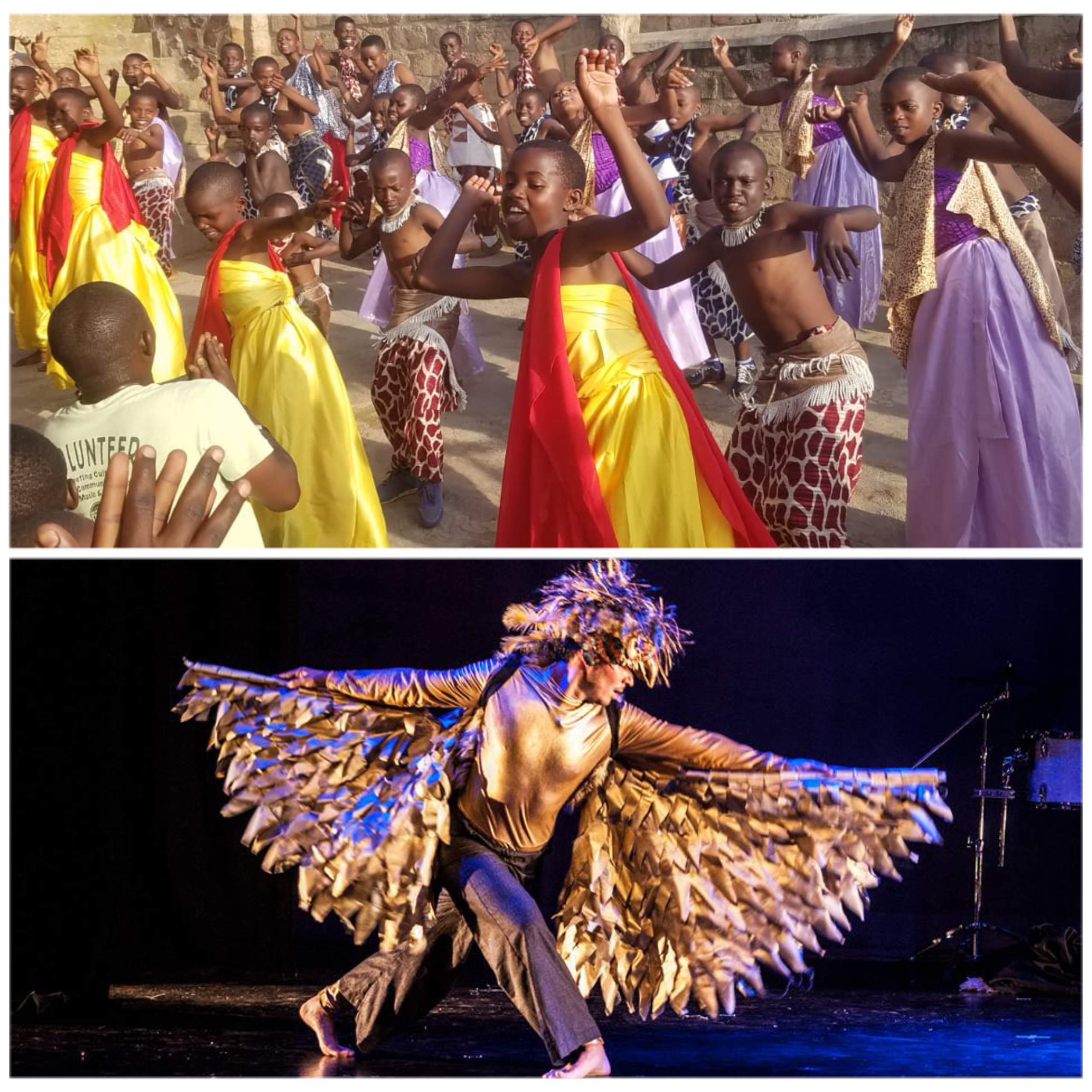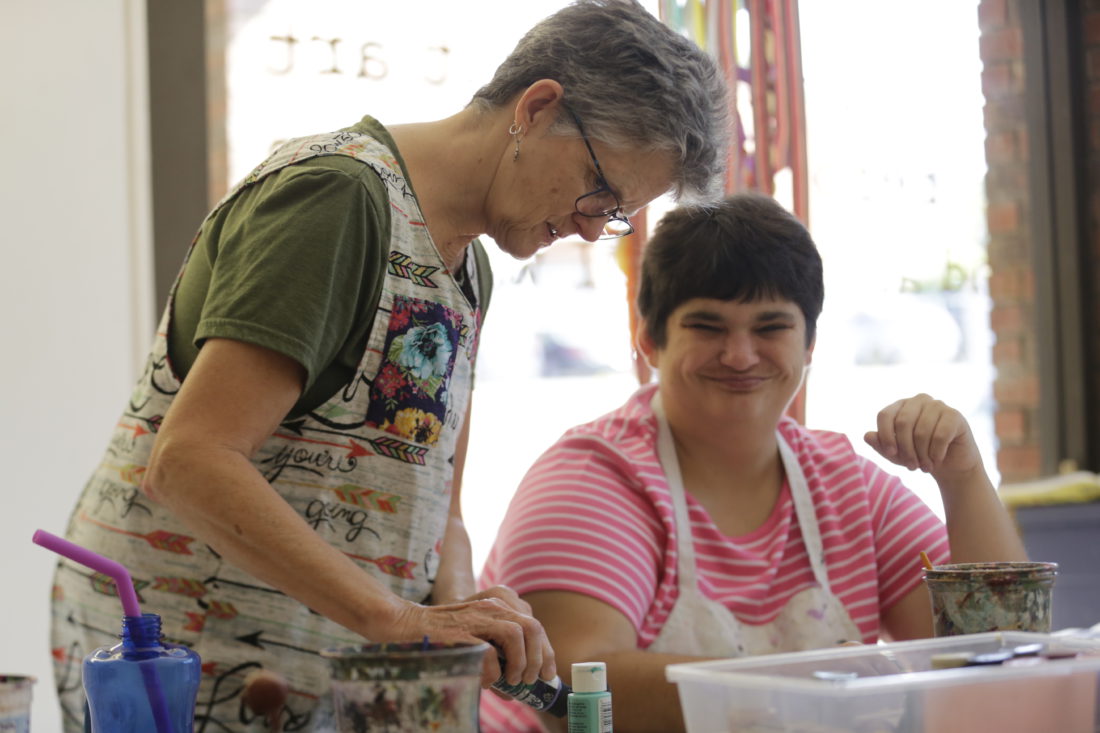Last weekend, the Lake Eden grounds in Black Mountain were supposed to be teeming with artists, vendors and attendees celebrating the spring LEAF Festival. But with COVID-19 restrictions preventing large gatherings, LEAF Global Arts decided to combine the event with its annual fall festival, Oct. 22-25, for a special 50th festival celebration. In its place May 15-17 was V-LEAF, a free online weekend of programming featuring some highlights from LEAF’s history.
The change of plans resulted in a $275,000 loss of what LEAF Global Arts Executive Director Jennifer Pickering calls “mission-critical revenue that is the cornerstone of our work throughout the year” involving music and cultural arts education and experiences. Indicative of the arts nonprofit’s expansive reach, however, the decision’s effects were wide-ranging.
“It’s not only LEAF that depends on the festival. There’s so many artists — handcrafters, vendors, culinary artists — that not being able to have LEAF is a sincere impact on their finances and their life and their spirit as well,” Pickering says.
Economic hits
While V-LEAF encourages virtual attendees to shop online and support artists and makers that they would have encountered at Lake Eden, those within the industry have significantly suffered over the past two months. To help gauge the impact, Katie Cornell, executive director of the Asheville Area Arts Council, points to Americans for the Arts’ ongoing “Economic Impact of Coronavirus on the Arts and Culture Sector” survey, where 78 arts organizations in Buncombe County have reported over $4.2 million in lost revenue so far.
“For perspective, there are — or were — almost 500 arts organizations, 200 of which are nonprofits, and 9,000 creative jobs in Buncombe County before the pandemic,” Cornell says.
The AAAC’s mission is to keep the arts at the heart of the local community. Its primary focus areas at the beginning of 2020 were arts advocacy, new professional development opportunities for the sector and public art, but when the severity of COVID-19’s impact became clear, Cornell and her colleagues “immediately shifted into full advocacy mode.”
“We launched several impact surveys and did our best to keep our local government and state arts agencies informed about what was happening to our creative community,” Cornell says. “We also created a robust resource page to provide arts organizations and professionals with the latest news and resources. Additionally, we have done our best to promote new arts programming and raise awareness about the importance of the arts sector.”
Current AAAC endeavors include partnering with Buncombe County Schools on a Toilet Paper Art Auction to raise money for the BCS’ Resource Center to provide markers, sidewalk chalk and other art supplies to families in need. The auction started on May 14 and runs through Saturday, May 23. The AAAC is also working with local arts leaders to create a reopening plan for the local creative sector and is partnering with Mountain BizWorks, the Center for Craft and UNC Asheville on a series of upcoming webinars to support local creatives.
However, the AAAC canceled what would have been its 10th annual Creative Sector Summit, originally slated for May 1-2, and Cornell feels that grants, donations, memberships and event revenue for these local groups are going to be hard to come by for the foreseeable future.
“Organizations that rely on bringing large numbers of people together will suffer the most. It’s hard to limit seating in a theater in order to social distance and still make enough money to cover the expenses of putting on the show,” she says.
“There is also so much free virtual content out there right now that it’s very hard to make money from online events. Nonprofits can apply for grants for programming but rely heavily on donations and event revenue to cover their operational expenses. Without donations and event revenue, it will be very hard for most nonprofit organizations to stay in business.”

Prior to COVID-19, Pickering says, LEAF had already been working on decreasing its dependency on large events. Though the financial hit from the spring festival is substantial, once pandemic restrictions kicked in, the organization was able to funnel its membership dues toward its Schools & Streets and international programs, ensuring that 100% of its 2020 commitment to local educators and Culture Keepers around the world would be fulfilled.
Many teachers and students have adapted to digital instruction, but Pickering notes that the technology required to participate isn’t a given on a local level, and especially not in Culture Keeper countries like Costa Rica and Haiti, where internet is unreliable or unavailable. “When the world starts again,” she says these individuals will be able to make all of their classes up “in creative ways with expansive community resources.”
Living room art
Open Hearts Art Center, which serves adults with disabilities, has likewise navigated the digital divide. Within 10 days of the stay-at-home order being put in place, co-founder/co-director Sonia Pitts and her administrative team developed a plan to provide services to its artists via what she calls “telehealth.”
For artists not interested in these virtual offerings or for whom the adaptability is too difficult for their family to maneuver, Open Hearts staff has offered one-on-one services in the artists’ homes, taking strict precautions and practicing social distancing, as well as a “skeleton crew of under 10 people” at its studio Monday-Friday. Artists who can use telehealth are provided presanitized supplies (including a few laptops) as they take part in imaginative and resourceful lessons developed by the staff to keep face-to-face computer interactions engaging.
“Sessions have included visual arts, adapted yoga, virtual museum trips with the group to ballet performances and national zoos, sign language classes and even dance parties,” Pitts says. “The continuity of services for our participants has successfully eliminated a variety of mental health concerns that could have easily become crises.”
To those ends, Open Hearts’ alternative services have been essential, but Pitts is a firm believer that “nothing can truly replace the value of human interaction with peers.” In returning to those traditional practices, arts nonprofits face an uncertain future, but these three leaders and others will, in Cornell’s words, work to ensure that “everyone has access to arts and culture” and “that we will be there to help our creative community rebuild when this is all over.”
“It’s worth noting that our nation has turned to the arts to help them cope during this unprecedented time. Therefore, we are hopeful that the arts will be seen as vital rather than elective in the future,” Pitts says. “Overall, we’d love to see our community grow stronger from the challenges we have faced together, including a resurrection within the arts, when this pandemic ends. Asheville has always supported local businesses, and we expect that to continue.”





Before you comment
The comments section is here to provide a platform for civil dialogue on the issues we face together as a local community. Xpress is committed to offering this platform for all voices, but when the tone of the discussion gets nasty or strays off topic, we believe many people choose not to participate. Xpress editors are determined to moderate comments to ensure a constructive interchange is maintained. All comments judged not to be in keeping with the spirit of civil discourse will be removed and repeat violators will be banned. See here for our terms of service. Thank you for being part of this effort to promote respectful discussion.